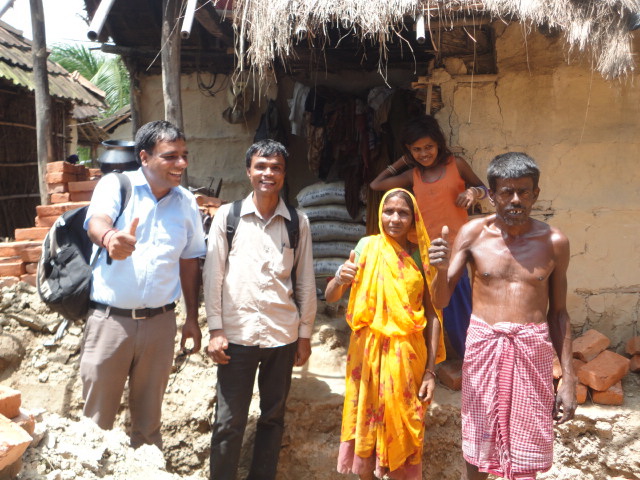By Hari Joshi and Maria Horning, Geneva Global.
Darshan Mandal, is a third generation agricultural bonded labourer, known locally as a “haruwa.” For many decades, the Mandal family has been caught in a cycle of debt bondage, forced to provide labour to local landlords with no end in sight. Darshan gets very little time off and is often required to work over 14 hours a day. Despite his hard work, he is not able to earn enough to pay off the debt that his family has owed the landlord for generations.
Although bonded labour has been legally abolished in Nepal, this traditional system of slavery continues to thrive in south-eastern Nepal. Within these families, men work as tillers, and women, children, and the elderly work as cattle herders or as domestic workers for landowners.
Darshan shares a one-room, 110 square-foot hut with his wife and four children. The land on which they live belongs to a landowner who can force them off at a moment’s notice. Landlords in this area use threats of eviction to force bonded labourer families to work without due payment. Darshan is barely able to send his children to school, which adds to the risk that they will also continue in bondage. Like many bonded labourers, Darshan has a dream of owning his own home. He wants to send his children to school regularly, provide his family with enough food, and one day have a life of freedom and dignity – free of debt.
With the help of a Freedom Fund partner organisation, Janachetana Dalit Sangam (JDS), Darshan and other agricultural bonded labourers are now able to realise their dreams. Through a program run by JDS, Darshan and other bonded labourers in his community learned to mobilise the community to collectively advocate for the right to the land on which they live and for homes of their own. With the help of JDS, community members waded through a tedious process of document submission and meetings with government officials. These tireless efforts paid off as 70 families, including Darshan’s, were granted residential rights to land and building materials for house construction.
As a result, Darshan has started constructing his family’s new home. With rights to his own land, the family is no longer susceptible to eviction, and the landlord’s threats and coercion hold no power, enabling Darshan to choose where he would like to work.

The foundation of new homes for haruwa-charuwa community members have been laid. These homes will provide improved shelter for 70 families within the Freedom Fund’s project in Saptari. Credit: Janachetana Dalit Sangam.
Darshan expresses what this means to him:
“Most people living in Madhupati and Haripur of Saptari district are Dalit* and haruwa-charuwa [bonded labourers]. We work for landowners in the village. We were not properly unified before and were exploited at our work and every area of our life. Representatives of JDS have united us and taught us to protect the rights of minorities and under-privileged groups through advocacy. We organised several meetings to discuss our rights and our desire to improve the situation of our community. With the support of JDS, the construction of 70 houses under the [government’s] People’s Residential Program has been approved and recently the construction of houses has begun. We want to thank JDS for their support. Our dream to have land and a house registered in our name has been fulfilled.”
* Dalit means from a caste facing severe discrimination.
Featured photo: Geneva Global Program Manager Hari Joshi (left) and Janachetana Dalit Sangam Executive Director Ganesh Prasad Ram (second to left) stand with Darshan Mandal and his wife, on the location where his new home will be built. Credit: Janachetana Dalit Sangam.



